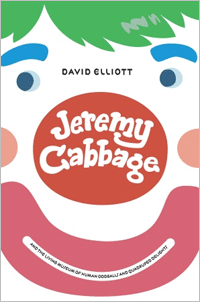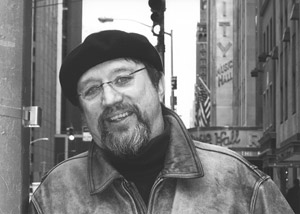
The Transmogrification of David Elliott
Children's book author David Elliott has crossed an invisible threshold in his life.
The gregarious humanities faculty member and director of International Student Services at Colby-Sawyer has written his first novel for older children, sold it to a major publishing house, Alfred A. Knopf, and optioned the work as a motion picture to Fox 2000, part of the Hollywood studio 20th Century Fox.
“I'm enjoying it as it comes,” says Elliott. “But like everything else in life, it might tumble down tomorrow. My standard inscription for The Transmogrification of Roscoe Wizzle [Elliott's first middle grade novel] is 'Life is change.' I'm trying to remember that.”
Elliott's new book, Jeremy Cabbage and the Living Museum of Homo sapien Marvels and Quadruped Delights, takes place in a dystopian world controlled by a ruthless baron. The hero, Jeremy, is a homeless child who in the novel's first chapter finds himself at an establishment much like a dog pound, except its residents are primarily children. His quest is to reunite with a friend from whom he became separated through events that occurred prior to the book's beginning.
“There are some connections to current events, but I can't say more right now,” Elliott teases.
“I was getting ready to go to the dump…”
Elliott had written 15 of the book's 42 chapters when his literary agent, Sarah Burnes, sent the unfinished manuscript to Rich Green, a film agent at Creative Artists Agency in Los Angeles. Two weeks later, Green called to tell them he was “totally nuts about the book.” Elliott recalls, “Rich was extremely enthusiastic, but more importantly he understood what I was trying to do.” Three weeks later, Fox 2000--which in addition to “The Devil Wears Prada,” produced award-winning “Walk the Line,”--made an offer on Elliott's manuscript.
“I got the call at home,” Elliott says. “I was just getting ready to go to the dump.”
In June, he met the producers and Greene for lunch in New York while they were in town for the premiere of “The Devil Wears Prada.” Small talk ensued about Meryl Streep's portrayal of the film's ruthless main character, until someone noticed the person the character was based on, Vogue editor Anna Wintour, seated nearby.
“They wanted to put a face to a name, but it was also clear that they had read those 15 chapters very carefully,” Elliott says. “Part of their enthusiasm for the project is based on one of the questions the book asks – what defines a family? But when I set out to write the book I wasn't thinking consciously of that. I was just trying to tell a story. That's the writer's job.”

A Trilogy?
The idea for the book came to him four years ago, while lying in bed drifting between sleep and wakefulness. He distinctly heard someone say, “he'll do,” and began to wonder, who is that, and to whom is he speaking? Eventually two characters began to emerge and the story started to unfold.
Elliott always resists sitting down at his desk, even as the story tugs at him. “You have to give up a great deal. Writing is a solitary act,” he says. “But countless hours at the keyboard have taught me that what writer Octavia Butler says is true, 'Habit is more important than inspiration.' Many people don't understand this, but it is perhaps the truest thing about the writing life. Among other things, habit helps develop the writer's ear so that he can hear the story. If you can't hear it, you can't get it on the page.”
Knopf and Fox 2000 expect the book will turn into a series or at least a trilogy. “I'm trying to have faith that the trajectory will continue,” Elliott says. “The second story is already spinning out there.”
“What we hope will happen is that Knopf will put the book on a fast track, and that it will come out around the same time as the movie,” Elliott adds. “But I try not to think about it. Right now, my main concern is that the book is as good, as true to itself, as it can be. Everything else? Well, that's gravy.”
-Kimberly Slover


